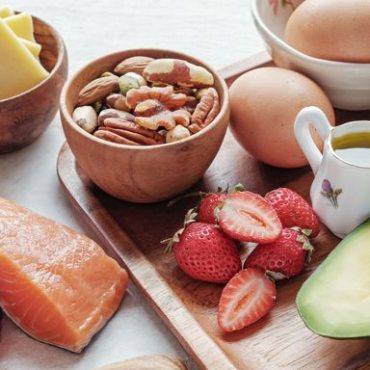
21 January 2019
What is intermittent fasting?
The concept of intermittent fasting (IF) is not new, yet you will find that it is often hailed as the latest diet trend by the media these days. Chances are, if you are a health-conscious individual, you have heard about intermittent fasting.
Where did intermittent fasting come from?
Human beings evolved as hunter-gatherers, which meant that a constant food supply was not given and we had to search for food near and far to satisfy our hunger. Now – for the first time in history – our food supply is not scarce, and we are flooded with an abundance of food in all forms that are available to us 24/7.
Due to us being perfectly adapted to not eating for extended periods of time, fasting should actually be considered a more natural pattern of eating than consuming food three, four or even more times a day.
Intermittent fasting takes us back to our natural rhythm (or absence of it), and is often described as:
“a pattern of eating that cycles between periods of eating and fasting.”
There are many benefits to it, but before we dive into them, let us look at the most common methods applied today.
How to do intermittent fasting
There are a variety of ways to intermittently fast, the most common ones being the types listed below:
· Beginners level: 12-14 hour fasts
· The 16:8 method: also called “leangains” (you skip breakfast (or whichever meal is easiest for you) and eat only during a time window of eight hours a day)
· The 5:2 Diet: you consume 500-600 calories on two non-consecutive days in a week and eat normally for the other five days
· Eat-Stop-Eat: you fast for 24 hours, once or twice a week
How women differ from men
Women should be more careful when starting intermittent fasting for a variety of reasons.
First of all, women’s blood sugar levels are more sensitive to not eating than men’s. Studies found that women’s blood sugar actually got worse over the period of three weeks that they were intermittently fasting, whilst men’s blood sugar levels improved. This is due to calorie restriction being read by the female body as starving, which puts the body into a state of emergency (and remember, female bodies need to make sure they are capable of conceiving a child at any time during their reproductive years and safely carrying a baby).
Secondly, fasting affects the hypothalamus, a small part of the brain that regulates important reproductive hormones. Not eating can disrupt the secretion of gonadotropin-releasing hormone (GnRH), and when this happens, women risk getting irregular periods, becoming infertile and even a decrease in bone health.
Thirdly, most studies have been on males only, meaning that that results cannot simply be applied to women. In fact, more studies have been conducted on rats than human females!
However, there are a range of health benefits to intermittent fasting, and when applying them with care, everyone can reap those benefits.
Benefits of intermittent fasting
#1:Autophagy
Not eating for an extended period of time activates autophagy, a detox process that helps the body clean out damaged cell parts and generate new ones. By getting rid of old and broken part of cells, our systems naturally become “rejuvenated”, and studies have shown that this in turn increases lifespan (in rats by as much as 83%!), prevents neurodegenerative disease and improves our daily bodily functions. Oh, and did we mention that it also reduces our risks of cancer and Alzheimer’s?
#2: Weight loss
One of the most common reasons for people to intermittently fast is weight loss. Indeed, IF can lead to rapid weight loss – mainly because people consume fewer calories, as their eating window is shorter, and to pack in as many calories during that time is more challenging. A 2018 review of studies concluded that the average loss weight for a period of 3-12 months was 7 kg.
In addition, IF has shown to preserve muscle mass, which is important for burning calories even at rest. Furthermore, human growth hormone is also increased (up to five times), which further supports fat burning and muscle growth.
#3: Lower risk for non-communicable diseases
IF can significantly lower the risk for diabetes (as insulin levels are lowered and insulin resistance is reduced), lower the risk for heart disease (as it improves contributing factors such as blood pressure, cholesterol, triglycerides) and lower the risk of inflammation and oxidative stress (the body becomes more resistant to oxidative stress and fights free radicals more effectively).
#4: Brain health
The brain can greatly benefit from IF as it supports the growth of new neurons and also protects the brain from damage by free radicals.
#5: Mental health
Intermittent fasting has been shown to improve physiological wellbeing, including successfully lowering depression levels. This is due to an increased production of the neurotropic growth factor, which relieves depression, boosts cognitive function and even decreases the risk of binge eating disorder behaviours.
Tips on how to get started with intermittent fasting
If you have decided to give IF a go, we have gathered some tips on to ease into it slowly:
· Do not start on a day that demands your full physical or mental presence.
· Start with a shorter fasting period (like 12 hours a day) and work your way up to 16 hours over the course of a few weeks.
· Women should try crescendo fasting (fast 12-16 hours two to three days weekly).
· Test whether it is easier for you to skip lunch or dinner (therefore fitting it to your lifestyle).
· During your fasting window, make sure to drink enough fluids. These include water, herbal teas, black coffee and bone broth.
· Take it easy on days when working out (possibly do your workout in the evening if you are fasting in the morning).
· And, of course, check with your doctor first if you have a medical condition like diabetes, an eating disorder or are underweight or pregnant.
Also, experiencing side effects in the first week is rather common and you may therefore feel hungry, a bit weak and light-headed, and even experience mild headaches. Just remember to push past these symptoms – the benefits are worth it!
____
Not keen on trying intermittent fasting? The #keto diet can give you similar results without limiting your eating window: Is the ketogenic diet right for you?





